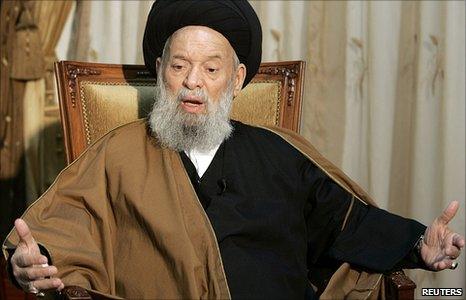Obituary: Grand Ayatollah Mohammed Hussein Fadlallah
- Published

The ayatollah declared himself disappointed in Barack Obama's Mid-East policy
He was a fierce critic of the United States and Israel, and used many of his Friday prayer sermons to denounce US policies in the Middle East.
He was targeted by unknown assassins in 1985, at the height of Hezbollah's suicide bombing and hostage-taking campaign in Lebanon.
Yet Lebanon's Grand Ayatollah Mohammed Hussein Fadlallah, who has died aged 74, was also known for his moderate position on women and Islam.
Among his fatwas, or religious edicts, was one that allowed women to wear nail polish during prayers.
But he was also branded a terrorist by the US, and named on a 1995 blacklist.
Fadlallah, who held the title "sayyed" to indicate claims of direct lineage with the Prophet Mohammed, died at Bahman hospital in Beirut on 4 July.
He had been a supporter of Iran's Islamic revolution and was customarily described as the spiritual leader of the militant movement Hezbollah when it was formed in 1982.
That was a claim which both he and the group denied.
Assassination attempts
Fadlallah was born in the Iraqi city of Najaf in 1935, where he studied religious sciences.
He also studied jurisprudence, logic, Arabic and philosophy before moving in 1966 to Lebanon, where he rose swiftly up the clerical hierarchy.
In the 1980s, at the height of the Lebanese civil war, US media claimed he was behind the seizing of American hostages by Iranian-backed radical Islamic groups. Other reports named him as a mediator in the crisis, but his real role never became clear.
However, in interviews and writings throughout his life he often made reference to the need for those resisting oppression to fight back with equal or greater force, even as he denied direct involvement with militant attacks.
In later years Fadlallah's links with Hezbollah became strained as he distanced himself from its ideological links to Iran's Islamic republic, and his views became more moderate.
But the cleric retained his opposition to the US and Israel, calling for a boycott of American and Israeli products.
He also continued to advocate suicide attacks as a means of fighting Israel, and only last year he issued a fatwa forbidding the normalisation of ties with the Jewish state.
He survived several assassination attempts, including a bombing apparently aimed at him in 1985 in Beirut, in which some 80 people were killed.
He appeared to welcome the election of Barack Obama in the US, telling the Wall Street Journal in 2009 that "some of his statements show that he believes in the method of dialogue".
He added: We don't have a problem with any American president, but our problem is with his policy that might affect our strategic interest."
Reputation for piety
Yet in another interview given in 2009, the ayatollah spoke of his disappointment at President Obama's Middle East policy, accusing him of being "under pressure" from Israeli supporters and "not a man who has a plan for peace".
The Americans may have regarded Fadlallah as embroiled in terrorism, but in Lebanon and many parts of the Shia Islamic world he was revered as the most eminent spiritual guide, says the Βι¶ΉΤΌΕΔ's Jim Muir in Beirut.
He rapidly gained a reputation for piety and scholarship through his teaching and the many books and treatises he wrote.
But he was also an activist, our correspondent adds.
He established religious schools and foundations, clinics and libraries. He was in favour of the Islamic revolution in Shiite Iran, and advocated armed resistance to Israel.
Away from politics, the white-bearded Fadlallah was also known for relatively liberal views on women.
He issued a fatwa forbidding female circumcision, and was opposed to the "honour killings" of women by their families.
In 2009, as France was debated whether to ban the full body veil, Fadlallah accused the French president of "banning women from choosing their own clothes".
He also had opposed the call to "jihad," or holy war, by Osama bin Laden and the Afghan Taliban, which he considered to be a sect outside Islam.